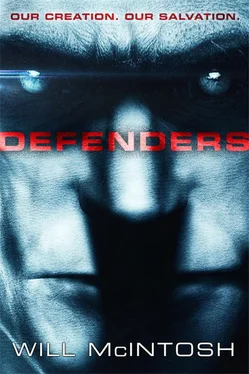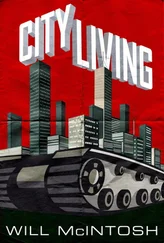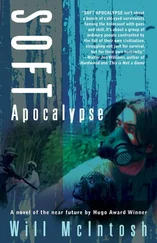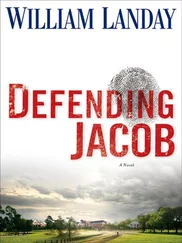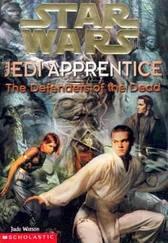“Probably less than fifty miles. We’re getting into more densely populated territory.” Forrest took her hand, and, glancing back, Dominique realized he’d waited until they were out of sight of the caravan before doing so. The few people who had coupled up over the past eighteen months were all discreet about it, probably because they were aware of how many of the others were lonely, and recently widowed. Some didn’t know whether they were widowed, whether their children were dead or alive. She was so grateful she didn’t have children.
“I’m so tired.” It came out before she could stop it.
“Me, too.”
“I’m not sure I understand the plan. We’re just going to slip into some town and hope the defenders don’t notice us?”
Forrest glanced at his watch. “I’m not sure there is a plan. Maybe a few of us slip into one town, a few into another.”
“I doubt the president would split us up like that. It would mean we were giving up the resistance.”
“No, you’re right.”
Forrest paused, frowning. Dominique was going to ask him what was the matter, then she heard it, too: an aircraft engine, getting louder. They bolted into the woods. Dominique ran, arms up to keep branches from whipping her face, following Forrest’s back. The engine grew louder. She heard another, farther away.
Forrest stopped abruptly, ducked behind a tree. Dominique squatted behind him, panting, a plume of vapor jetting from her open mouth.
A Harrier roared past, flying low, following the logging trail. Just before it flew out of sight, a defender in full battle gear appeared in the rear doorway and leaped out. A small chute deployed as it dropped.
“Oh, no.” Dominique leaped up.
Forrest caught the back of her jacket and tugged her back down. “We’re unarmed. We’re no help to anyone.”
Gunfire erupted in the distance. Panicked shouts. Dominique squeezed her eyes shut as screams reached her, the sounds of people dying, of her friends dying.
“We have to get out of here,” Forrest said.
“There might be survivors. Wounded. We have to see.”
“Right now we have to run.” Forrest took her hand, led her deeper into the woods. They ran down a slope, and when they came to a stream Forrest surged right through; Dominique followed, her feet numb as soon as they hit the water.
Far behind them, she heard the whump of an explosion, followed closely by two more. They were taking out the vehicles, so anyone they missed would be left to freeze, with no shelter, no supplies.
They had nothing, Dominique realized. No blankets, no food, no weapons. She slowed, called out, “ Wait. ” Forrest stopped. As he turned she could see from his expression that there was no need to point out the seriousness of their situation.
The sharp crack of a branch sent a fresh jolt of fear through her. She and Forrest dropped to the ground and crawled on their bellies until they were hidden by a copse of trees. Slowly, carefully, Dominique raised her head to look in the direction of the sounds.
Two defenders topped the rise a hundred yards away, both clutching rifles. She looked at Forrest, passed a silent question: Should they run, or stay down and hope the defenders missed them? Neither seemed a good idea.
A voice boomed in her head. Dominique nearly cried out in surprise. Run. Two hundred yards, directly away from them.
She exchanged another look with Forrest, who nodded. What did they have to lose? They sprang up as one, sprinted away. A clump of trees was between them and the defenders, masking their flight. They’d covered a hundred yards before Dominique heard a shout of discovery from the defenders. Ahead through the trees, she could see bright shifting colors—four Luyten, heading toward them.
We’ll carry you: Dominique, run to me, orange; Forrest, run to violet.
She didn’t want to put her life in the hands of a Luyten, but she saw no choice. As she approached the orange Luyten, it swept her up with its powerful cilia, like ropes roughly lashed around her legs and waist, pressed her to its stony body, and ran like hell.
Dominique’s head bounced and jostled; the forest passed in a sideways blur as the defenders’ shouts grew louder. A blast rocked the ground a dozen yards short of them, just as they reached a steep hill—a cliff, really. The Luyten kept going; Dominique wanted to shout for it to stop but couldn’t muster the breath. The Luyten half climbed, half fell down the steep ravine, using the cilia on all of its free limbs to clutch and scrape at the rocks and dirt as they plunged hundreds of feet.
It hit the ground upright and galloped across a shallow river, then broke into trees on the opposite bank. Forrest was nowhere in sight; Dominique wondered if they’d fled straight into an even worse fate. If the Luyten had wanted her dead, all they would have had to do was wait. But if they didn’t want her dead, what did they want with her?
What we want right now is to keep you safe , the Luyten said. Then we want to get you and Forrest to Washington, D.C.
Dominique was stunned. “Why would you want to do that?”
Because we’ve agreed to an alliance with your people, and you have expertise that can help us.
Dominique was positive she’d misunderstood, or more likely the Luyten had misspoken. An alliance? The idea was simultaneously chilling and absurd.
Yet as the Luyten slowed, and uncovered the camouflaged entrance to a tunnel in the ground, Dominique had to admit the idea also made an odd sort of sense.
October 25, 2047. Washington, D.C.
Lila’s hands were shaking as she called up the defenders’ specifications—the genetic recipe Dominique Wiewall had developed to create the defenders. To introduce an entire neurotransmitter system into the existing framework, which had been meticulously designed to create an intelligent organism that functioned without that neurotransmitter, was a staggering proposition. Even with a trained staff assisting her, it would have been a challenge. But alone? It was going to take a long time. How long, she couldn’t guess, because she wasn’t sure how she was going to do it. It would be far easier if she could redesign the defenders from scratch, if she weren’t also trying to hide the fact that she was doing this. Then she could simply back up and start over with the specifications for a human brain, and design something close to a defender. But these defenders had to look exactly like the existing ones, and to act like them.
As she typed a few tentative variations, she watched the genetic code transform before her eyes. Without the Mizrahi protocol, which translated genetically expressible characteristics into genetic code, it would take years to design these changes. It was amazing, really, that she hadn’t had to think in terms of adenine, cytosine, guanine, and thymine since graduate school. All of that was automated.
Lila jumped as a voice blared in her head.
Minka is coming to see you about an employee. She’ll be at your door in less than two minutes.
Lila masked the program she was working on, called up a productivity report. She had no idea the Luyten was eavesdropping, but it made sense—they had as much riding on this as she.
After Minka left, Lila waited, in case she thought of something else and returned.
All clear , the Luyten said before she could resume work on her own.
When darkness came Lila texted both Kai and Erik to tell them she wouldn’t be home until late. She went on working, knocking back coffee, driven by anxiety, blocked not only by a dawning understanding of how difficult, if not impossible, this was, but by doubts about whether she should be doing it at all.
Читать дальше
